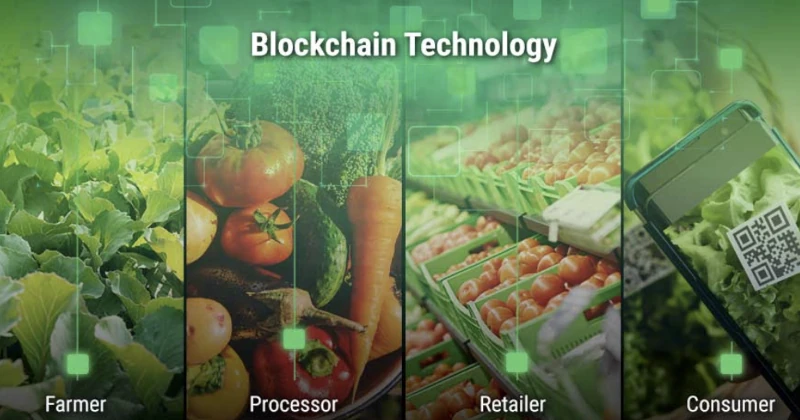Blockchain, a decentralized technology, has the potential to enhance food supply chains by boosting transparency, efficiency, security, and trust. It could empower consumers, delivery personnel, retail outlets, as well as food and beverage enterprises with access to an immutable and traceable transaction history. By leveraging blockchain, transaction costs and time could be minimized, while simultaneously bolstering consumer trust, production speed, product efficiency, food safety, and policies.
Ways Blockchain Technology Transforms the Food and Beverage Industry:
- Enhanced Supply Chain Transparency: Real-time visibility across the supply chain can be achieved through blockchain, enabling tracking of food product origins, quality monitoring, and ensuring safety for consumption.
- Improved Traceability: Blockchain facilitates a tamper-proof record of all supply chain transactions, mitigating fraud risks and guaranteeing the authenticity of food products.
- Ensured Food Safety: Real-time monitoring of food products via blockchain helps in early detection of contamination or spoilage, thereby preventing widespread issues.
- Increased Efficiency: By automating processes like inventory management, order processing, and payment processing, blockchain can significantly reduce time and costs associated with supply chain operations.
- Streamlined Collaboration: Blockchain provides a shared platform for stakeholders in the food and beverage supply chain, fostering better collaboration, minimizing errors, and ensuring alignment.
- Combatting Fraud: The tamper-proof nature of blockchain records reduces the likelihood of fraud, safeguarding the authenticity of food products and preventing counterfeiting.
- Enhanced Transaction Transparency: Through blockchain, every transaction in the supply chain is securely recorded, ensuring authenticity and preventing counterfeit products.
- Building Consumer Trust: Transparent transaction records via blockchain help build consumer trust by ensuring the authenticity of food products and preventing counterfeiting.
- Promoting Sustainability: Blockchain’s comprehensive record of the supply chain steps aids in waste reduction and environmental sustainability.
Robotics Revolutionizing the Food & Beverage Industry:
Robotics, an engineering field focusing on designing and operating machines for human-like tasks, plays a vital role in the food and beverage sector. It enhances hygiene, supplements labor, and saves time, transforming the industry in various ways:
- Utilization in food processing operations from farm to fork.
- Deployment of vision-guided robotic arms, automated guided vehicles, delta robots, and advanced inspection systems to streamline processes, uphold food safety and quality standards, cut labor costs, and meet increasing demands.
- Current usage in 40% of palletizing operations and 26% of packaging lines.
- Application in picking and placing, production, processing, and secondary packaging.
- Trends like dark kitchens, cobot applications, food safety emphasis, digitization, sustainable packaging, and scalability are shaping the industry.
Automation Revolutionizing the Food & Beverage Industry:
Automation in the food and beverage sector involves systems operating with minimal human intervention, delivering benefits like operational excellence, customer satisfaction, and sustainability goals. Automation transforms the industry by:
- Boosting revenue through cost reduction, enhanced productivity, and new revenue streams.
- Ensuring food safety and quality by minimizing errors, maintaining standards, and ensuring traceability and compliance.
- Adapting to consumer demands by enabling flexibility, customizations, and innovations.
- Optimizing resource management by reducing energy consumption, waste, and environmental impact.

